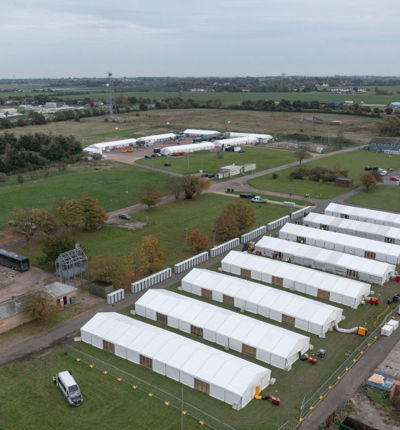
Legal challenge to failure to give asylum seekers access to lawyers at Manston asylum centre
Bail for Immigration Detainees (BID) has launched a legal challenge to the Home Office over a failure to provide access to justice for people being held at Manston asylum centre in Kent.
Posted on 03 November 2022
The independent charity challenges immigration detention in the UK by providing free legal advice and representation to detainees.
By holding detainees at the non-residential Manston Short Term Holding Facility (STHF) for more than 48 hours without allowing adequate access to phones or legal help, the Home Office has breached its own rules and the European Convention on Human Rights (ECHR) Article 5: Access to justice, says BID.
Today it has sent a legal letter to Home Secretary Suella Braverman formally challenging the unlawful failure to provide access to outside support. The pre-action protocol letter signals the start of the judicial review process which could result in a High Court challenge to failures at Manston.
BID’s letter asks the Home Secretary to immediately provide legal advice surgeries at Manston and to help people at the centre to access legal advice.
Under Section 147 of the Immigration and Asylum Act 1999 people can be detained at STHF for seven days and STHF Rules 2018 add that residential STHF can hold people for seven days and non-residential STHF “holding rooms”, like Manston, can hold people for just 24 hours.
When asylum seekers are held for more than 48 hours, STHF Rules 2018 state that they are entitled to access to phones, support from non-government organisations (NGOs) and legal guidance.
Rule 27 of the STHF Rules 2018 states that people must be permitted confidential meetings with their legal adviser.
Rule 7 states that detainees must be provided with information about their detention and rights. They should be given a copy of the 2018 rules, information about bail application procedures, information about the right to seek legal advice, and the information should be provided in a language that the detainee can understand.
However, the latest HM Inspector of Prisons Report lists failures to ensure that Manston detainees are aware of their legal rights. Information that should be provided under Rule 7 was displayed in holding rooms, but only in English, with little space for detainees to meet or call lawyers.
Mobile phones access was extremely limited and only available for detainees to make calls once they had been issued with their immigration papers, but they were not routinely offered.
There was a stock of mobile phones in each marquee, but they were not routinely offered and some detainees who asked to make a phone call were refused.
There was no internet access or payphone in any of the facilities, and nowhere to make private phone calls to legal representatives.
BID’s letter says that provisions for helping detainees obtain legal advice at Manston STHF are inadequate when compared with provision at other detention facilities. At Immigration Removal Centres there are regular legal aid advice surgeries to ensure that detainees have access to initial free legal advice so that they can find out whether they are lawfully detained and have access to solicitors who can pursue a bail application or an unlawful detention claim on their behalf.
There is no provision for legal aid advice surgeries at Manston STHF and detainees are not allowed to keep their own mobiles phones.
In light of the evidence that Manston STHF is being used to detain people for periods equivalent to those of standard Immigration Removal Centres, BID’s letter states the Home Secretary should have ensured that the essential safeguards in place to protect against arbitrary detention and mistreatment at Immigration Removal Centres are applied at Manston STHF.
The letter also states that as well as a breach of Article 5 ECHR, conditions are Manston could amount to a violation of Article 3, in subjecting detainees to inhuman or degrading treatment.
BID is represented by law firm Leigh Day where human rights team partners Waleed Sheikh and Jacqui McKenzie have been instructed.
BID legal director Pierre Makhlouf said:
“People are being denied access to their legal right to apply for bail before an independent court, a process that would allow enquiry into their needs including their ability to access accommodation and support. Individuals need to be allowed to exercise their rights and the courts need to be allowed to consider cases of people in these circumstances.
“Keeping people in appalling conditions, dumping people on the streets without support and withholding information on their right to access legal rights is an inhuman approach towards those in need of compassion, and results in a breach of the legal standards the UK has set for itself.”
Leigh Day partner, Waleed Sheikh said:
“It is extremely worrying that vulnerable people many of whom will have endured traumatic journeys to the UK, and will include families and young children, are then then being detained for excessive lengths of time in Manston. The lack of access to legal advice not only prolongs their detention unnecessarily, it will undoubtedly increase the anxiety and insecurity that these people must no doubt be feeling. Our client is therefore asking the Secretary of State to arrange access to legal advice for those detained in Manston on an urgent basis.”
Jacqueline McKenzie, partner and head of immigration and asylum law, said:
“This challenge has come about because our client is extremely concerned about the prolonged detention of people seeking asylum, including unaccompanied minors, in horrific circumstances. Manston is not fit for purpose and was meant to be no more than a short-term facility for processing asylum seekers within 24 to 48 hours.
"Their detention, which in some cases has gone on for several weeks, without access to legal advice, NGO support, telephones, and family visits, is in breach of the Home Office’s own policies and breaches a number of statutory provisions. Moreover, this treatment of asylum seekers puts us in breach of our obligations under the Refugee Convention and International Declaration of Human Rights.”




